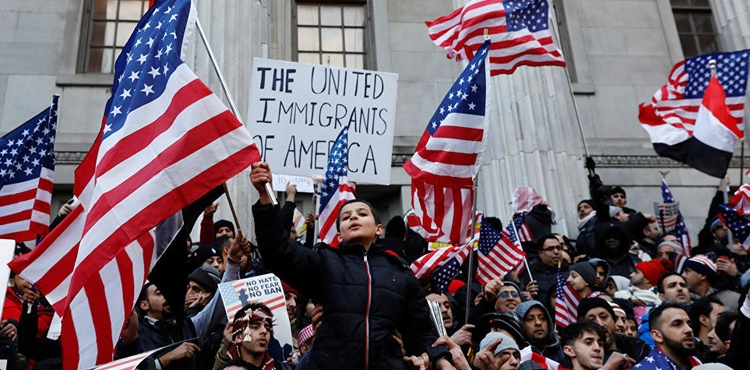Immigrants in the United States are waiting for the presidency of Joe Biden with a mixture of hope and caution, as his arrival raises feelings of relief after four years of strict restrictions imposed by Donald Trump, but he was also a vice president of former President Barack Obama Considered by many to be the biggest supporter of the deportations.
Gabriela Hernandez, 22, who came to the United States from El Salvador at the age of five with her mother, says she is "not very impressed" with the next president, but she is "very optimistic that this administration will try to work with us."
For a start, Biden promised to launch a citizenship pathway for the nearly 11 million people who live in the United States without a permit.
He also announced his support for immigrant protection programs that Trump tried to cancel, such as the postponed measures under the Dhaka program for unauthorized immigrants who were brought to the United States in childhood, knowing that they give children protection from deportation and allow them to work.
In 2012, Obama launched the Dhaka program, which covers about 700,000 people known as "dreamers", and for many of them the United States is the only country they know.
In 2017 Trump attempted to dismantle the program, citing its unconstitutionality, sparking a drawn-out court battle.
The Dhaka program survived the cancellation, but was only partially returned by the Department of Homeland Security.
Biden has pledged to fully reinstate the program when he takes office in January, although he needs Congressional support to do so, but the battle for the two Georgia state Senate seats on January 5 will settle the matter.
One of the beneficiaries of the program, Hernandez, said the latter was "nothing but an aid".
"The Dhaka program is kind of putting this little umbrella over a few million people," the young woman added.
Biden faces the arduous task of rolling back the Trump era´s measures against immigration, reforms that "have taken place at an unprecedented, even frenzied, pace" as described by the Immigration Policy Institute.
With more than 400 enforcement actions, the Trump administration "has systematically dismantled and rebuilt a system based on a global view of immigration as a security and economic threat to Americans," according to the think tank itself.
One of Biden inherits is running the US Immigration and Customs Enforcement detention centers, which now house about 15,000 people who have been arrested without documents.
But Biden revealed promising measures, after complaints that exposed improper dealings that resulted in some immigrants, including minors. Biden promised to hold US immigration and customs officials accountable for any inhuman treatment of immigrants.
To reinforce this approach, Biden has nominated Alejandro Mayorcas, who came to the United States as an immigrant from Cuba, to take over the Department of Homeland Security, which runs these centers.
However, caution continues to prevail despite these encouraging indications.
Jorge Benitez, who is also a "dreamer," said he still felt the fear he was feeling under Obama, when the deportation of undocumented foreigners reached record levels.
He explained that Biden "was part of that. He was a very active party. So, yeah, we still have to be careful."
The sentiment is shared by William Martinez, who arrived from El Salvador with his family after an earthquake devastated their country in 2001.
They have been granted so-called temporary protection status, which is granted to people from countries experiencing natural disasters or political instability.
Trump tried to eliminate this program as well. The case is still in the corridors of the courts.
Martinez, 28, said he does not expect much help from Biden for beneficiaries of the program and instead looks to Congressional action, believing the solution lies in bipartisan legislation.
Martinez will participate in advertising campaigns for the Georgia poll on January 5, which will determine which party dominates the Senate.
"We are going to Georgia, we need a good Congress that will agree with us to pass legislation," he said enthusiastically.
But Richard Avila, a 66-year-old Vietnam war veteran born in Mexico was more optimistic.
Avila was deported from the US to his country after years of drug addiction and serving time in prison.
"It served its interest," he said of the decision taken by the government he fought for in Vietnam, pointing out that the content of the decision says, "We do not need you anymore and you will be deported."
He now lives in Tijuana after repeated attempts to return to the United States, and considers every day he spends in Mexico a "struggle".
But he says Biden is sympathetic and open-minded about immigration, and hopes that if he can find a solution to the Dhaka program, he will allow people like him who have been deported to raise the issue of return.
He commented, "I feel very optimistic with the arrival of this new administration."












